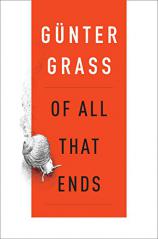Of All That Ends
Review
Of All That Ends
In 1999, Günter Grass won the Nobel Prize in Literature for THE TIN DRUM, a deeply dark look at the many upheavals of the 20th century, a novel that was published four decades earlier. Over the course of his prolific career, Grass wrote essays, plays, short stories and poetry in addition to novels. He was a social critic and Germany's best-known writer.
In OF ALL THAT ENDS, the aging author and artist looks at life from various moods, including playful, brooding and philosophical. Using poetry, soft-pencil drawings and essays, he gazes both backward and forward. He stares death in the face. Many, if not most, of his drawings depict the natural decay of things. His drawings of feathers and bent nails are the few that reveal his natural talent without reminding the reader of mortality.
"Grass’ final work...certainly showcases his unique perspective and his many talents, which made him a highly successful and well-respected author."
In what is more or less a distillation or summing up of his thoughts on life, his words and drawings wander around, in an almost stream-of-conscious manner. No subject seems to escape his musing. He is toothless now except for one stalwart remaining tooth that he shows off to the consternation of his young grandson. He writes lovingly of his prized possession, an Olivetti typewriter that he received as a wedding present. A self-described Luddite, he has little use for the all-pervasive internet. He brags that when no one is looking he writes with a goose quill. Being the unconventional fellow that Grass is, the reader is sometimes uncertain if he is speaking honestly or having a joke at his or her expense.
Grass laments the losses that accompany aging, such as the loss of taste and smell --- including the ability to smell oneself --- as well as the inability to travel. He needs less sleep now, and a friend has encouraged him to get his words down on paper before they slip his mind's precarious grasp.
In the longest essay, Grass discusses the hiring of a master carpenter to build him and his wife wooden coffins to their specifications. No quilted lining is required since the couple intends to lie upon a bed of leaves as well as be covered in them. The carpenter accepts the unusual request, and soon they are having a lie-in to check out their final resting place. But even the best plans are thwarted when a burglar steals the two coffins and leaves all other items untouched. The reader wonders, but is not certain, if there might be some hidden symbolism in the theft of the coffins.
Grass’ final work (he passed away in 2015) certainly showcases his unique perspective and his many talents, which made him a highly successful and well-respected author.
Reviewed by Carole Turner on December 9, 2016
Of All That Ends
- Publication Date: December 6, 2016
- Genres: Essays, Nonfiction
- Hardcover: 176 pages
- Publisher: Houghton Mifflin Harcourt
- ISBN-10: 054478538X
- ISBN-13: 9780544785380





